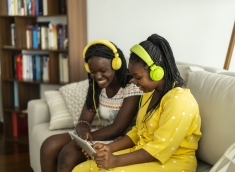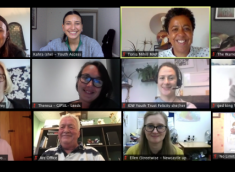BACP is delighted to be an ally to Youth Access’s newly launched National Youth Counselling Working Group. This is an exciting and very timely initiative. In our ongoing campaign to have school counselling delivered across the four nations of the UK, this new network offers an opportunity to showcase the work done by local services like Youth Access’ members and to highlight the importance of the third sector in delivering vital, high-quality counselling services that mean so much to the young people who use them.
From my years of youth work and as a children and young people’s sessional worker in a vibrant, community-based third sector counselling organisation, I know just how important it is to make available a range and choice of mental health support services, such as those offered within the Youth Access YIACS (Young Information, Advice and Counselling Service) model, and what a difference they can make to the lives of children and young people.
I believe that free-at-the-point-of-access youth counselling services, with a choice of either a school or community setting, should be available for every child or young person. Whilst advocating support to children and young people in education, we also need to build support for the many young adults who struggle with their mental health who do not go to university or are often hidden from support services. These community-based services can be a lifeline for young people who have left education or would rather not access support within mainstream provision.
The vital role of the voluntary sector
My clients were often in that ‘missing middle’ group – those young people who fall through the gaps in NHS service criteria and find local community-based provision to be both more accessible and acceptable.
Research carried out by Youth Access and BACP in 2018 demonstrates the crucial role that voluntary sector services play in provision to older young adults, working with those who are all too often at risk of falling through the gap in the move from child to adult NHS services or as they leave school and go on to work or university.
The research found that voluntary sector counselling services are associated with positive changes in young people’s lives, are accessible to those from a variety of diverse backgrounds, with service usershappy with their care and treatment. The research also found that counselling in third sector services is associated with significant short‐term reductions in psychological distress, at a level comparable with the statutory and educational sectors.
These findings reflect my own experience of working for Youth Access member Service Six, in Northamptonshire. My clients were often in that ‘missing middle’ group – those young people who fall through the gaps in NHS service criteria and find local community-based provision to be both more accessible and acceptable.
And yet, funding and sustainability for services like Youth Access YIACS, which support young people of all age groups, is an ongoing concern. I am pleased that the BACP policy team has recently added a Third Sector Lead to strengthen our understanding of the sector’s challenges and to support their work. For my part, as the Children, Young People and Families Lead within the policy team, my aim is to widen our campaign work to be more inclusive of young adults accessing community-based counselling provision and to be increasingly mindful of including a choice of community settings when campaigning for funded school and college counselling provision.
Looking beyond schools
We need to address any disparity in provision and continue to widen the choice available to children and young people.
One thing to explore in our current campaign work is flexibility in our focus on how school counselling is delivered. Whilst some schools may recruit a counsellor, we also have great examples of schools commissioning counselling from expert third sector providers. Whatever the model, the aim must always be to deliver the best and most accessible support to clients.
Both the Northern Irish and Welsh school and community counselling models provide choice of settingand offer important learning as we shape our campaign call in England. Many young people don’t want to be seen in school - the stigma of seeing a counsellor never quite goes away for some.
The voluntary sector has a huge role to play in any potential government-funded counselling provision in England and already provides crucial services commissioned via the NHS or local authorities. We need to address any disparity in provision though, and continue to widen the choice available to children and young people.
We know that a handful of counselling services have been commissioned as part of the Mental Health Support Teams (MHST), including agencies such as TIC+ in Gloucestershire, and Youth Access members 42nd Street in Manchester and Croydon Drop-in. We will work to showcase these projects, and are very keen to hear about others, to highlight the critical role counselling plays within early help but also when there are more complex issues where needs just cannot be met by the limited numbers of MHST’s themselves.
BACP also wants to increase engagement with the many voluntary sector services and agencies providing counselling that aren’t operating in the Government’s trailblazer areas, particularly as MHST sites only aim to work with 20 percent of the nation’s children and young people by 2022. This leaves a huge gap, particularly as recent research from the Institute of Public Policy Research found that only 48% of schools offer on-site counselling services – fewer than in 2010. The figures also show a discrepancy between private and state schools, and schools in wealthier or more deprived areas, which is worrying but not surprising.
This is why the timing for this new collaboration between BACP and Youth Access is so crucial, leading to ample opportunities to explore joint campaign ideas. The National Youth Counselling Working Group will also provide a direct line of communication between BACP as your professional membership body and the many Youth Access network members that we seek to serve.
Lastly, as a youth worker by trade and a counsellor to my core, I’m also keen for young people to be involved with BACP’s children, you people and families policy work, to co-shape our campaign work, placing them at the heart of our work, ensuring it is a young person centered as possible. I am looking to this network to help us achieve this.

